INTERNACIONAL
Johnson accuses Schumer of blocking ‘real discussion’ to keep government open
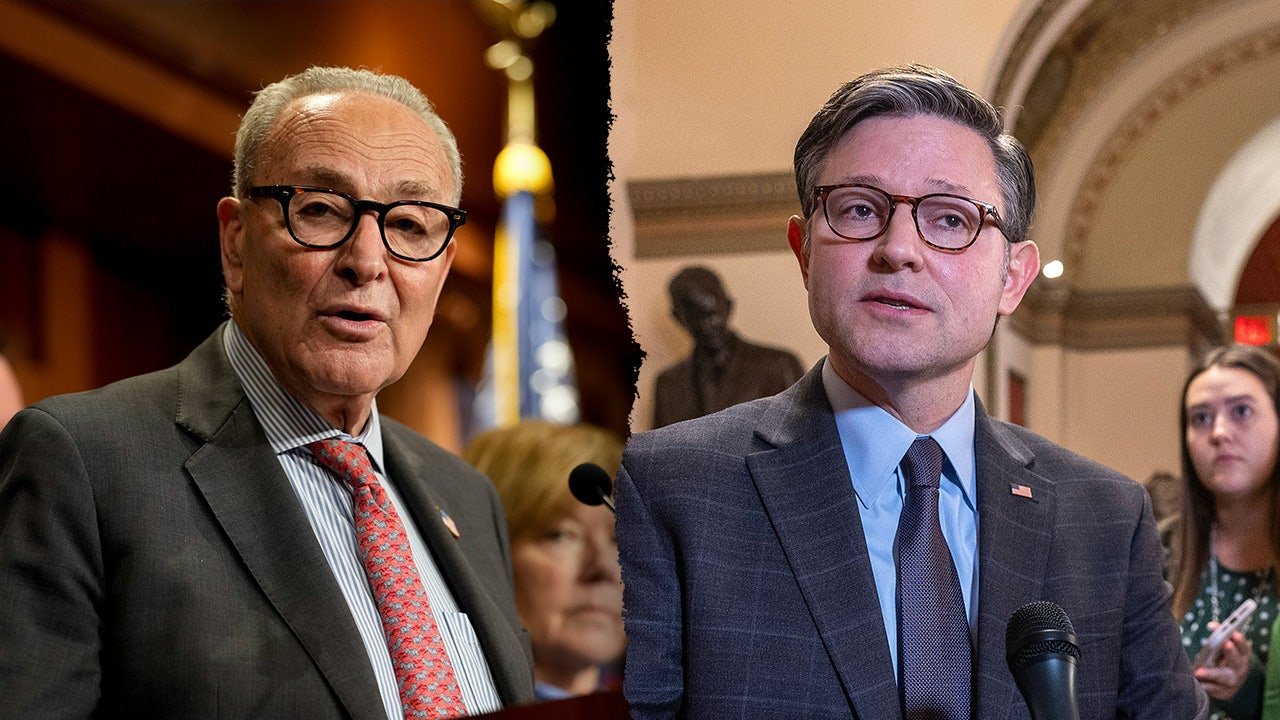
NEWYou can now listen to Fox News articles!
EXCLUSIVE: Speaker Mike Johnson, R-La., is accusing Senate Minority Leader Chuck Schumer, D-N.Y., of refusing to vote to end the government shutdown to kowtow to his left-wing base.
Johnson told Fox News Digital in a sit-down interview that Democrats’ refusal to budge on their current position came up in an hour-long call with President Donald Trump Wednesday afternoon.
«[Trump is] very bothered by that, that Chuck Schumer would do this, Democrats would do this, because we haven’t,» the top House Republican said.
He noted that Democrats had voted on a similar measure to what Republicans are offering on 13 different occasions under former President Joe Biden.
SOCIAL SECURITY, AIRPORTS, FOOD STAMPS: HOW ARE YOU AFFECTED DURING A GOVERNMENT SHUTDOWN?
House Speaker Mike Johnson, right, is criticizing Senate Minority Leader Chuck Schumer’s, left, for refusing to agree to a GOP-led plan to avert a government shutdown. (Kent Nishimura/Bloomberg via Getty Images; Tasos Katopodis/Getty Images)
«And even when the Republicans were in the minority, we did the right thing to keep the government open. And we fully expected that Schumer would do that again, as he always has, but not this time,» Johnson said.
«This is a selfish political calculation he’s made, that he’s got to prove to the far left that he’s going to fight Trump or something. So, we talked about our frustration with that.»
He said Trump appeared «happy» that Republicans remain unified in their federal funding stance but was concerned about the effects of a prolonged shutdown on everyday Americans.
REPUBLICANS ERUPT OVER SHUTDOWN CHAOS, ACCUSE DEMS OF HOLDING GOVERNMENT ‘HOSTAGE’
«But the reason we’re happy about that is because we know we’re doing the right thing for the American people,» Johnson said. «And Chuck Schumer and the Democrats are demonstrating that they are willing to inflict this pain upon the people for their own political purposes. And I think that is a tough thing for them to get over.»
He said of a meeting between congressional leaders and Trump that occurred Monday: «I tried my best in the White House, and he just is in no mood to have a real discussion about these issues. So, we are where we are.»

President Donald Trump, right, salutes Air Force Col. Christopher M. Robinson, commander, 89th Airlift Wing, before boarding Marine One upon his arrival at Joint Base Andrews, Maryland, Friday, Sept. 26, 2025. (AP Photo/Luis M. Alvarez)
Senate Democrats have now rejected a GOP-led plan to fund federal agencies through Nov. 21 three times.
The measure is called a continuing resolution (CR) and is aimed at buying House and Senate negotiators more time to reach a deal on fiscal year 2026 federal funding priorities.
The CR would keep current federal funding levels roughly flat while adding an extra $88 million in security spending for lawmakers, the White House and the judicial branch.
Democrats, furious at being largely sidelined in funding discussions, have signaled they would not accept any bill that does not also extend Obamacare tax subsidies that were enhanced during the COVID-19 pandemic. Those enhanced subsidies are due to expire at the end of this year.
But Johnson, who called the Obamacare subsidies an «end-of-year issue,» argued that the bill was a simple extension of federal funding, leaving Republicans with no realistic path for concessions.
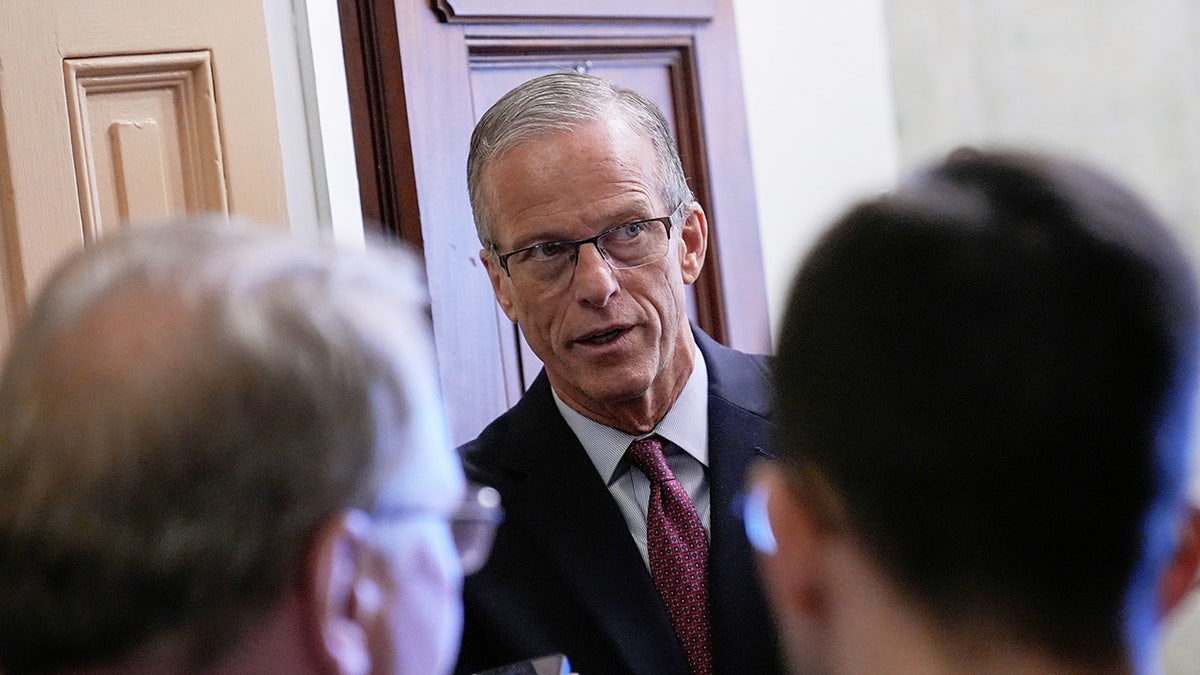
Sen. Majority Leader John Thune, R-S.D., speaks with reporters near his office on Capitol Hill Sept. 18, 2025, in Washington. (AP Photo/Mariam Zuhaib)
CLICK HERE TO GET THE FOX NEWS APP
«If it was not clean and simple, if I had loaded it up with a bunch of Republican partisan priorities, then there would be something for us to negotiate. I could take those things off and offer it again. I sent it over with nothing attached at all,» he said.
«It quite literally is just buying us time to finish the appropriations process, which was being done in a bipartisan manner. So, I don’t have anything to give, there’s nothing I can give. And Chuck Schumer has made such outrageous counter-demands and proposals that he’s the one that has to come to his senses.»
He was referring to Democrats’ counter-proposal for a CR, which would have repealed the Medicaid reforms made in Republicans’ One Big, Beautiful Bill, while restoring funding for NPR and PBS that was cut by the Trump administration earlier this year.
Fox News Digital reached out to Schumer’s office for a response but did not hear back by press time.
house of representatives politics,politics,senate,government shutdown
INTERNACIONAL
Qué podría pasar con las millonarias joyas robadas en el Museo del Louvre, según expertos en arte

Días después del sorprendente robo en el Museo del Louvre en París, crece la especulación sobre dónde podrían terminar las lujosas joyas robadas que una vez adornaron a la realeza de Francia.
Un grupo de expertos advierte que las piezas valuados en más de 100 millones de dólares (88 millones de euros) podrían pronto ser fundidas o descompuestos en partes. Si se hace con éxito, algunos dicen que esas piezas más pequeñas podrían luego ponerse a la venta como parte de un nuevo collar, pendientes u otras joyas, sin llamar demasiado la atención.
Leé también: Nuevas imágenes del robo del Louvre: así escaparon los ladrones por un montacargas con el botín millonario
“Ni siquiera tienes que ponerlas en el mercado negro, solo las pones en una joyería”, afirmó Erin Thompson, profesora de delitos artísticos en el John Jay College of Criminal Justice en Nueva York. “Podrían venderse a la vuelta de la esquina del Louvre”.
Thompson y otros dicen que esto se ha vuelto cada vez más común con joyas y bienes metálicos robados y señalaron que es una forma en que los ladrones pueden intentar cubrir sus huellas y ganar dinero.
Visitantes en fila para entrar al museo del Louvre tres días después de que joyas históricas fueran robadas en un audaz robo a plena luz del día, el miércoles 22 de octubre de 2025 en París. (Foto AP/Thibault Camus)
Las joyas pueden ser difíciles de monetizar. “Al descomponerlas, ocultarán su robo”, señaló Marinello, y añadió que estos artículos podrían volverse aún más “imposibles de rastrear” si se sacan de Francia y pasan por cortadores y cadenas de suministro robustas en otros países.
Aun así, tales piezas a menudo se venden por una fracción del valor de lo que fue robado, debido a su tamaño más pequeño, pero también porque fundir o descomponer artículos de alto perfil elimina su valor histórico. No es un proceso sencillo. “El verdadero arte en un robo de arte no es el robo, es la venta”, sostuvo Robert Wittman, ex investigador principal del equipo de delitos artísticos del FBI.

Foto suministrada por Interpol el 23 de octubre del 2025, tomada de su website, que muestra las joyas robadas del Museo del Louvre en París. (Interpol via AP)
A diferencia de otros, Wittman duda que los ladrones lograrán monetizar con éxito los artefactos que robaron del Louvre, que incluyen un collar y pendientes de esmeraldas, dos coronas, dos broches, un collar de zafiros y un solo pendiente usado por la realeza del siglo XIX. Señala que las gemas aún pueden ser identificables por su claridad, por ejemplo, y el oro que fue refinado cuando las piezas se hicieron hace cientos de años no es tan puro como lo que parcialmente se demanda hoy.
Otros expertos dicen que las gemas más grandes pueden ser recortadas hasta el punto de ser irreconocibles. Un desafío es encontrar personas que tengan la habilidad para hacer eso y no hagan demasiadas preguntas, pero es posible. Visitantes hacen fila para entrar en el museo del Louvre tres días después del robo de joyas históricas a plena luz del día, el 22 de octubre de 2025 en París. (AP Foto/Thibault Camus)
Video: vestidos como operarios, así escaparon los ladrones
Luego de días de misterio sobre el millonario robo que vivió el museo más importante de Francia, un nuevo video revela más detalles sobre aquel día. En las imágenes puede verse a dos individuos descender del edificio por un elevador montado en un camión con llamativa tranquilidad, tras haber realizado un asalto de película.
El video, que fue ampliamente compartido en redes sociales, parece haber sido filmado desde el interior del Louvre, con vista al río Sena, el domingo, según publicó The Telegraph.
Leé también: Identificaron al verdugo nazi de una de las fotos más estremecedoras del Holocausto Nuevas imágenes difundidas en redes sociales revelan cómo la banda escapó del Louvre en pleno centro de París (Foto: captura de pantalla de video)
Tras cometer el robo, dos hombres —uno con un chaleco de neón y otro con un casco de motocicleta— descienden lentamente en el compartimiento del elevador, mientras un tercer cómplice los aguarda al final del recorrido.
En ese momento, comienza a sonar la alarma de emergencia del museo, mostrando el instante exacto en que se detectó la violación del sistema de seguridad.
Difundido en redes sociales, el video muestra segundos más tarde cómo los asaltantes escapan en scooters. “Los individuos están en scooters, están a punto de irse”, se escucha exclamar a una persona, mientras de fondo suenan las sirenas policiales.
El Museo del Louvre permaneció cerrado durante tres días tras el incidente y reabrió sus puertas al público esta semana. Las piezas, pertenecientes a la colección de las joyas de la corona francesa y valuadas en 100 millones de dólares, continúan desaparecidas.
Por el momento, no hay consecuencias para la banda de asaltantes profesionales que logró escapar en tiempo récord.
Robo histórico: detalles del escape
Según detalló The Telegraph, la banda de cuatro asaltantes entró y salió en apenas siete minutos, utilizando el elevador montado en un camión.
Nuevos datos revelan que el grupo estacionó un vehículo robado frente al museo y empleó un elevador de obra para acceder a una ventana del segundo piso, que cortaron con una amoladora antes de ingresar a la Galería Apollon.

Continúa la investigación por el robo al Museo del Louvre. (Foto: Reuters)
Una vez dentro, las cámaras registraron cómo cortaban una vitrina de vidrio mientras visitantes observaban la escena. Luego intentaron prender fuego al camión utilizado para el ingreso y, en la huida, dejaron caer una corona con esmeraldas y más de 1.300 diamantes, perteneciente a la emperatriz Eugenia.
Leé también: Reabrió el Museo del Louvre tras el millonario robo de joyas de la corona francesa
Los ladrones escaparon por la misma ruta utilizada para ingresar. Descendieron por el elevador montado en el camión y posteriormente huyeron en scooter. Hasta el momento, no hay detenidos.
Louvre, video, Escape, robo millonario
INTERNACIONAL
Bernie Sanders defends Maine Senate candidate under fire for Reddit comments
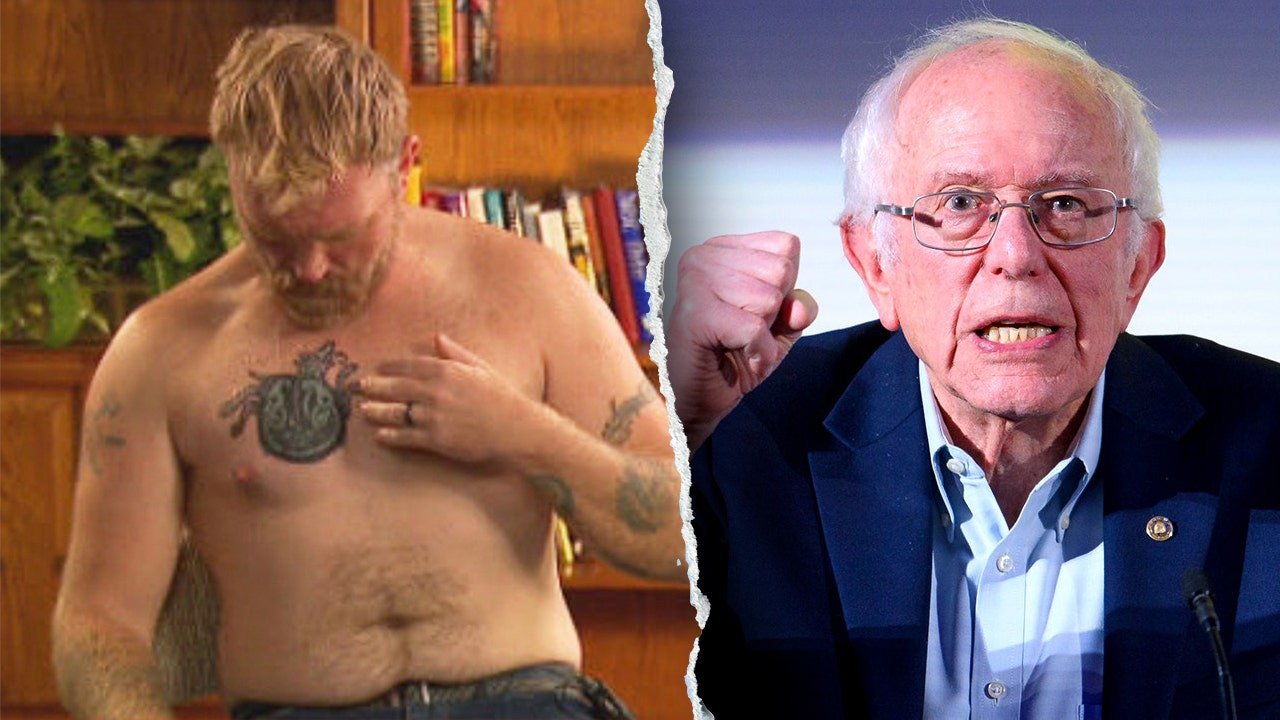
NEWYou can now listen to Fox News articles!
Sen. Bernie Sanders, I-Vt., is standing firm behind Maine Democrat Graham Platner, a first-time Senate hopeful facing outrage over a Nazi-style tattoo and resurfaced Reddit posts.
Sanders, in an interview with Axios, blamed the media for the fury about the tattoo and Platner’s deployments to Iraq and Afghanistan, where he said he went through a challenging chapter in his life.
«I’m not overly impressed by a squad of media running around saying, ‘what do you think about the tattoo on Graham Platner’s chest,’» Sanders told Axios on «The Axios Show.»
U.S. Senate candidate Graham Platner, D-Maine, speaks at a town hall at the Franco Center, Oct. 15, in Lewiston, Me. (Libby Kenny/Sun Journal via AP)
DELETED POSTS URGING VIOLENCE HAUNT DEMOCRATIC SENATE HOPEFUL IN MAINE RACE
It was revealed that Platner, a U.S. Marine and Army veteran and oyster farmer, once had a skull-and-crossbones tattoo resembling the Totenkopf used by Hitler’s SS paramilitary forces. He has since covered the image with another tattoo.
Meanwhile, resurfaced Reddit posts show him appearing to mock military sexual assault victims, criticize police, and make racially charged comments about tipping. He also said on the social media platform in 2018 that «all» police are bastards and called himself a «communist.»
Platner’s campaign has been rocked by the controversies with his political director, former state representative Genevieve McDonald, resigning in the aftermath of the Reddit posts — the tattoo controversy came after. Platner has apologized for both incidents.
A new poll shows Platner with a decisive lead among a crowded Democrat field. The University of New Hampshire’s Pine Tree State poll shows 58% of likely Democrat primary voters back him. The poll was taken during which the Reddit posts were surfacing, and before the tattoo controversy came to light.
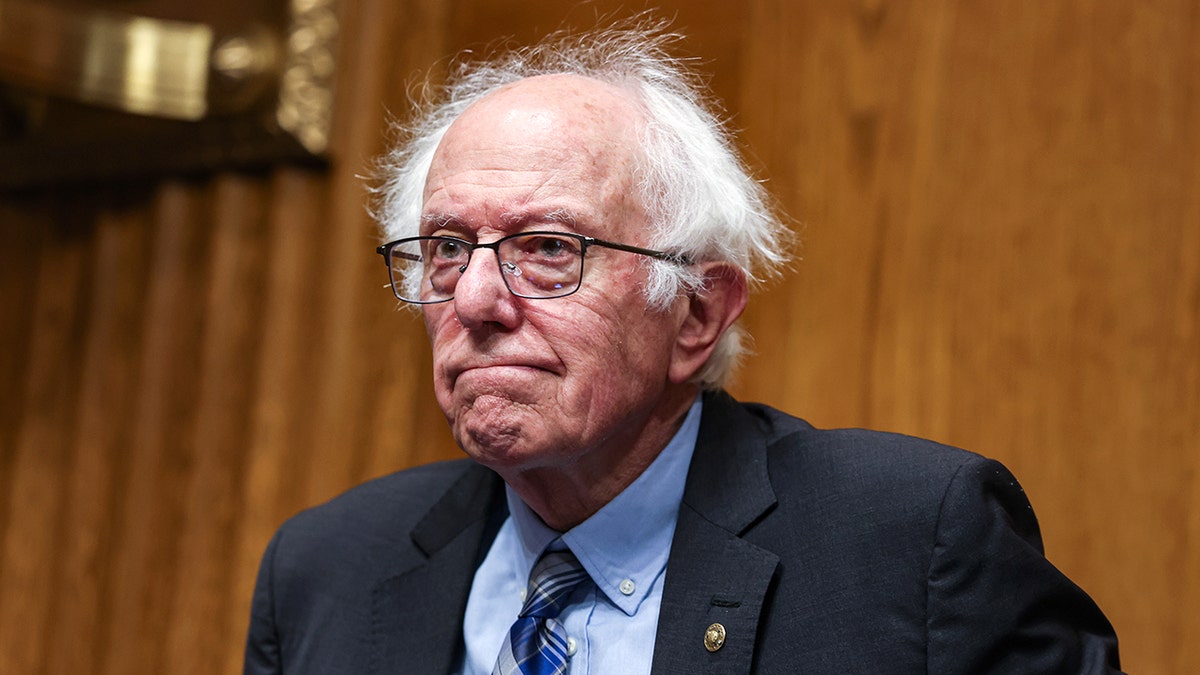
Senator Bernie Sanders blamed the media for the fury and said the public should focus on the issues facing ordinary Americans instead. (Valerie Plesch/Bloomberg via Getty Images)
Despite the disarray, Sanders is doubling down on his support of Platner, who is contesting a crowded field. He told the outlet that Platner «went into a dark period in his life» regarding the online posts.
«I suspect that Graham Platner is not the only American to have gone through a dark period,» Sanders said. «What he did was he expressed his darkness on the internet. Probably not a brilliant thing to do, alright? And he said things that are stupid, things that were hurtful. He has apologized for them.»
Sanders said the public should focus on the issues facing ordinary Americans instead.
REPUBLICAN LAWMAKER DIRECTS INVESTIGATION AFTER SWASTIKA VANDALISM DISCOVERED IN DC OFFICE
«I think what we have got to do as a nation is not focus on a tattoo,» Sanders said. «We’ve got to focus on a system which in many ways is collapsing.»
Platner said he got the tattoo in 2007 during a «night of drinking» while on leave in Croatia in the Marine Corps and claimed he did not know its historical associations at the time.

Graham Platner, a Democratic candidate for U.S. Senate in Maine, points to a covered tattoo that had previously been an image recognized as a Nazi symbol, during an interview on Wednesday in Portland, Me. (WGME via AP)
In a video posted to Instagram Wednesday afternoon, Platner elaborated that the design was chosen from a flash tattoo wall while «carousing» with fellow Marines in Split, Croatia.
«We thought it looked cool,» he said.
He claimed he had «lived a life dedicated to anti-fascism, anti-racism and anti-Nazism» and was «appalled» to learn it resembled a hate symbol.
Platner said he had the symbol inked over with a Celtic knot and imagery of dogs, a tribute to his family pets. He told the Associated Press he opted to cover it instead of removing it because there were no removal services near his home in rural Maine.
«This far more represents who I am now than even the skull and crossbones did,» he said on the video, lifting his shirt to reveal the new tattoo.

Senate Majority Leader Chuck Schumer, D-N.Y., is backing Maine Gov. Janet Mills for the Senate seat. (Kevin Dietsch/Getty Images)
In the Reddit posts, Platner reportedly asked, «Why don’t black people tip?» in response to a thread asking, «What is one question you have always wanted to ask someone of another race?» according to WGME.
He also argued that if people «expect to fight fascism without a good semi-automatic rifle, they ought to do some reading of history.» And in another post, he said, «an armed working class is a requirement for economic justice.»
CLICK HERE TO GET THE FOX NEWS APP
Senate Minority Leader Chuck Schumer, D-N.Y., is backing Maine Gov. Janet Mills for the Senate seat in the race to take on longtime Republican Sen. Susan Collins of Maine.
The University of New Hampshire’s Pine Tree State Poll shows Mills with 24% of likely voters and just 1% for any other candidate. About 14% remain undecided.
Meanwhile, Collins dominates the GOP field with 66% support, according to the poll.
Fox News’ Jasmine Baehr and Paul Steinhauser contributed to this report.
bernie sanders,maine,senate,politics,democratic party,chuck schumer,fox news media
INTERNACIONAL
Nueva York rinde homenaje a Jean-Michel Basquiat con una calle que lleva su nombre
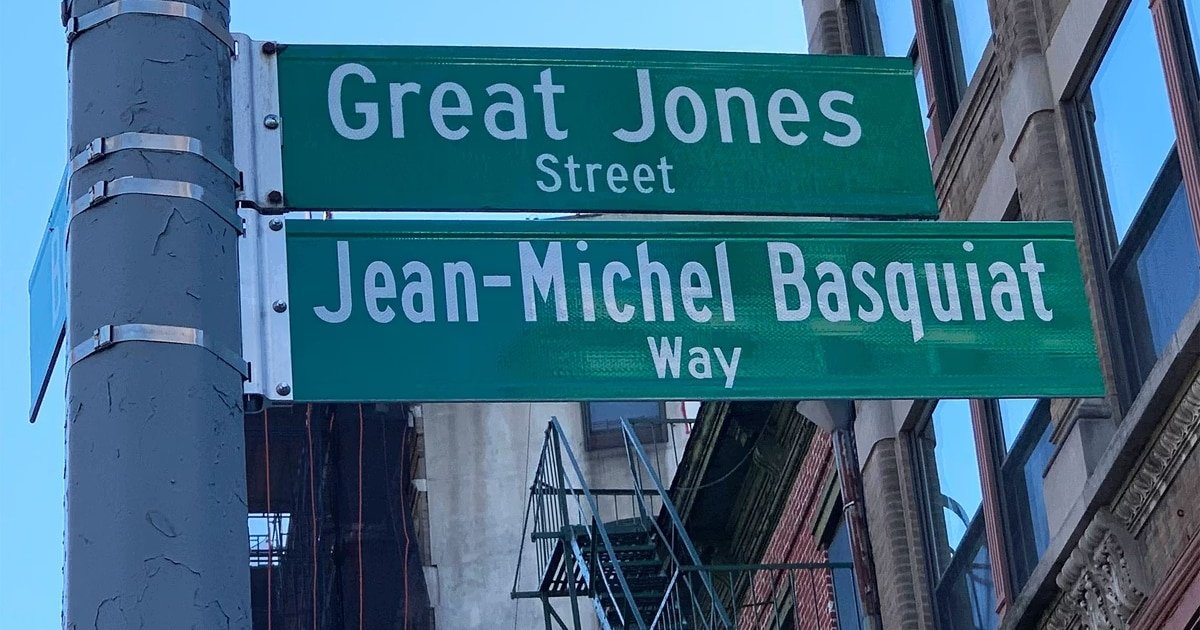
El artista Naderson Saint-Pierre estaba pintando en su estudio de Manhattan la mañana del martes cuando un amigo le avisó que su héroe, Jean-Michel Basquiat, iba a ser homenajeado por la ciudad de Nueva York con una ceremonia de nombramiento de calle esa misma tarde.
Con su overol manchado de pintura, tomó el metro hacia el centro, donde se unió a las personas reunidas frente al número 57 de Great Jones Street, el edificio bajo donde el Basquiat vivió y trabajó en el momento de su muerte en 1988.
La multitud estaba compuesta por residentes del East Village, periodistas de televisión local y admiradores que llevaban gorras y camisetas con el motivo de la corona de Basquiat. También había miembros de la familia del artista —hermanas, sobrinas, sobrinos, primos— y funcionarios de la ciudad. “Es un día hermoso para verlo ser homenajeado de esta manera”, dijo Saint-Pierre, de 30 años, “y que una calle lleve tu nombre es uno de los grandes honores de Nueva York”.

“Soy haitiano, como él”, continuó, “y cuando me mudé a la ciudad sin nada, vendía mi arte por 20 dólares en Tompkins Square Park y dormía en el metro. Basquiat también luchó en las calles antes de encontrar el éxito. Para mí, él es la prueba de que los sueños de un artista en Nueva York pueden hacerse realidad”.
El edificio de dos pisos en el 57 de Great Jones fue la base de operaciones de Basquiat, nacido en Brooklyn, cuando experimentó su ascenso al estrellato en el mundo del arte, y allí murió de una sobredosis de heroína a los 27 años. Durante años, artistas urbanos han dejado tributos en ese lugar con vibrantes versiones de su etiqueta de grafiti “SAMO”.
“Esto se siente como algo que llevaba mucho tiempo esperando”, dijo Michelle Hogan, residente del East Village. “Ahora los turistas que van a hacer fila afuera de Katz’s quizás puedan tener una verdadera muestra de lo que alguna vez fue el East Village y por qué este barrio fue tan importante para la historia del arte pop estadounidense”. Su esposo, Steve Hogan, estaba de pie bajo una valla publicitaria de Moncler con Al Pacino y Robert De Niro mientras observaba a la multitud frente al 57 de Great Jones, ahora sede de la boutique de moda de Angelina Jolie, Atelier Jolie.

“Basquiat merece este honor”, dijo Hogan, “pero no sé qué pensaría él sobre cómo luce ahora esta cuadra y el centro de Nueva York”.
El concejal Erik Bottcher se dirigió a los presentes. “¡Bienvenidos a la calle Jean-Michel Basquiat!” dijo, entre aplausos. “Como él dijo una vez: ‘No pienso en el arte cuando trabajo, trato de pensar en la vida’. Hoy, honramos a un hombre cuyo arte reflejaba la vida en toda su complejidad: la belleza, la lucha, la verdad”.
Bottcher entregó una carpeta azul con una proclamación oficial a las hermanas del artista, Lisane Basquiat y Jeanine Heriveaux. Mientras Lisane contenía las lágrimas, Jeanine agradeció a la ciudad por asegurarse de que la “estrella de su hermano mayor siga brillando intensamente”.

Un gran aplauso se escuchó cuando alguien tiró de la cuerda que retiró la cubierta que ocultaba el letrero de la calle “Jean-Michel Basquiat Way” en la esquina de Bowery y Great Jones. Entre la multitud estaban dos personas que ayudaron a impulsar el nombre honorario, la exconcejala Carlina Rivera y el historiador del hip-hop LeRoy McCarthy.
En la planta baja de Atelier Jolie, amigos y familiares de Basquiat se sirvieron palitos de yuca y tostones con salsa de ajo. La señora Heriveaux y la señora Basquiat subieron las escaleras hasta el espacio del atelier que alguna vez fue el dormitorio del artista, lleno de pinturas. “El hecho de que, en 2025, en el contexto de todo lo que está ocurriendo, él sea homenajeado de esta manera por la ciudad de Nueva York es profundamente significativo e impactante para nuestra familia”, dijo. “Agradecemos el reconocimiento”.
“Veníamos a menudo a visitarlo aquí”, dijo la señora Heriveaux. “Es emotivo estar aquí. Pero al mismo tiempo, hay una sensación cálida al estar aquí”.
Pensó en lo que su hermano podría haber sentido ante el homenaje de la ciudad. “Creo que habría estado eufórico”, dijo. “Él quería ser famoso. Eso es algo que expresó”.
Una vez que la multitud se fue, la cuadra volvió a su ritmo habitual. Repartidores pasaban rápidamente en bicicletas eléctricas. Personas vestidas a la moda almorzaban en las mesas de la acera frente al Bowery Hotel. Y el nuevo letrero con el nombre de Jean-Michel Basquiat brillaba bajo el sol.
Fuente: The New York Times
[Fotos: Michelle V. Agins/The New York Times]

 DEPORTE1 día ago
DEPORTE1 día agoUniversidad de Chile vs. Lanús, por la Copa Sudamericana: día, horario y cómo verlo por TV

 CHIMENTOS1 día ago
CHIMENTOS1 día agoAdabel Guerrero confesó de qué famosa está enamorada y que le encantaría tener relaciones: «La China Suárez me sorprendió con su belleza»

 ECONOMIA2 días ago
ECONOMIA2 días agoScott Bessent oficializó el swap con la Argentina y afirmó: “No queremos otro Estado fallido en América Latina”


























